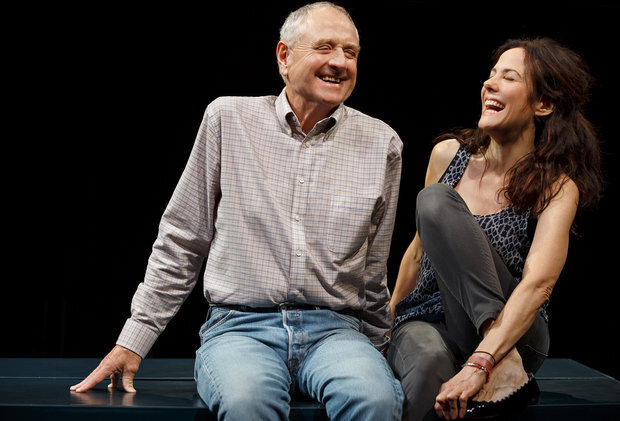Heisenberg
“I’m sorry. Was that an unnecessary act of confession?” The answer is yes. For almost 80 minutes straight, yes. The entirety of this play is too confessional and absolutely unnecessary.
That would be Heisenberg, the new play by Simon Stephens, playing on Broadway at the Samuel J. Friedman Theatre. A one-act, bare-bones look at the baffling interactions between two underwritten characters, Heisenberg offers a pretentiously philosophical take on the myth of the maniac pixie dream girl.
For those unfamiliar with the trope, the manic pixie dream girl (we’ll shorten that to MPDG) is the quirky, unpredictable woman who reminds the protagonist (always male, usually white, always brooding and upper-middle-class) of the joys of living spontaneously. The MPDG was explored brilliantly by Zoe Kazan in her film “Ruby Sparks,” and in Heisenberg she is personified by Mary-Louise Parker, an actress known for her unconventionally brilliant performances. And while Parker’s turn in this play is unconventional, I found it, and the play, less than brilliant.
Parker plays Georgie, a woman with an appropriately childlike name, who pursues (translation: stalks) an older man she meets when she kisses him on the back of his neck (translation: sexually assaults him) in a train station. Dressed in youthful clothes – skinny jeans, a blousy top and ballet flats – Parker’s Georgie has a grating voice, an unexplained occasional lisp and a childlike abandon of manners and tact in her interactions with Alex.
Alex is played by Denis Arndt, who is making his Broadway debut in this play. And an impressive debut it is, with him bringing a tender bewilderment to Alex’s reaction to this unexpected opportunity for romance. A solitary recluse who is all but celibate, he finds company in listening to music and imagining conversations with his dead sister. At Georgie’s insistence, an unexpected May-December romance begins and, thanks to Arndt’s indulgently endearing reactions to Georgie, when audiences realize her motivations in romancing him may not be exactly pure, it’s all but impossible to not sympathize with him.
Staged with sterile efficiency by Mark Brokaw, Heisenberg is deliberately small-scale, even in a Broadway theater. Some of the audience is invited to watch onstage in stadium-style seating, offering more intimacy, but to what? The only props in Mark Wendland’s set are two tables and two chairs. Oh, and one pillow.
While the underlying academia of Heisenberg lies in physician Werner Heisenberg’s uncertainty principle, I found myself much more intrigued by the gender politics of the play. Georgie’s pursuit of Alex – after kissing him in the train station she tracks down his butcher shop and appears there, uninvited – could easily be described as harassment. She then asks him to take her to dinner and invites him to sleep with her. To some, the uninvited and determined pursuit of a lithe and lovely younger woman might be a dream come true, but I found their interactions unsettling, even before her ulterior motives were revealed. When Alex says, “I haven’t agreed to go on a date with you,” her reply is “Not yet, you haven’t.”
Georgie’s function as the MPDG is overplayed; at times this critic wanted to shout, “We get it! You’re quirky!” In between her random philosophical spouting about “technology” and “the universe” she actually says, “We live once!” and describes herself as being “tremendously enthusiastic about chocolate.” While some may find this writing and performance – nervous ticks, rapid-fire chatter, a self-confessed jittery insomniac – charming, but I quickly found it grating. And while the idea of a romantic ending (for as long as Alex can sustain one) is sweet, the likelihood that it will actually take place is so slim that the play’s conclusion feels quite forced.“
Do you find me exhausting, yet captivating?” is just one of the narcissistic questions Georgie asks Alex. The answer, from this critic, at least is: Exhausting, yes. Captivating, no. Alex deserves better than Georgie. So do Broadway audiences.

